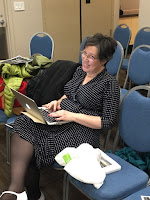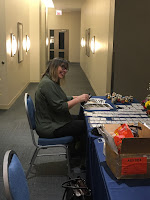F.E.A.S.T. of Knowledge event in Chicago: Unforgettable!

 The F.E.A.S.T. community put together an all-day event in Chicago,
one day after the International Conference for Eating Disorders ended,
with little notice and a lot of heart. It was a day none of us will
forget!
The F.E.A.S.T. community put together an all-day event in Chicago,
one day after the International Conference for Eating Disorders ended,
with little notice and a lot of heart. It was a day none of us will
forget!
 We counted 87 people in the room, a generous
mix of parents new to the topic of eating disorders and experienced
parents, as well as clinicians and researchers and eating disorder
advocates.
We counted 87 people in the room, a generous
mix of parents new to the topic of eating disorders and experienced
parents, as well as clinicians and researchers and eating disorder
advocates.
 Among our thanks for an informative and
empowering day are the venue, The Conference Center At University
Center. An ideal setting for our audience the room was lovely, the staff
warm and helpful, and the catering was, as one participant described
it,
Among our thanks for an informative and
empowering day are the venue, The Conference Center At University
Center. An ideal setting for our audience the room was lovely, the staff
warm and helpful, and the catering was, as one participant described
it,"quite the best packed lunch I've ever experienced at an organised event."

 See
below for the final program, but suffice it to say it was a buffet of
interesting ideas, people, inspiration, and accents! There were
participants from at least nine countries, and there were tears of both
laughter and sadness along the way.
See
below for the final program, but suffice it to say it was a buffet of
interesting ideas, people, inspiration, and accents! There were
participants from at least nine countries, and there were tears of both
laughter and sadness along the way.
 Due to the
livestream set up and managed by F.E.A.S.T. Executive Director, Belinda
Caldwell, the room also included hundreds of other participants online
during the day, and a steady stream since. We have lightly edited that
video and it is now available at no charge online, and linked below.
Due to the
livestream set up and managed by F.E.A.S.T. Executive Director, Belinda
Caldwell, the room also included hundreds of other participants online
during the day, and a steady stream since. We have lightly edited that
video and it is now available at no charge online, and linked below.
Among the topics we discussed: siblings, legally adult patients, boundaries, microbiome, target weight, re-feeding, advocacy in small countries, fathers, marriage, and privacy.
"fantastically arranged, filled with helpful information from some of the best"




We introduced a lot of people to one another and to the community that day, and many new relationships started. We encouraged the parent community to advocate for their families, and for better treatment for all families.
We learned about new science and shared sources for the important process of continuing to learn as we go. We heard from advocates and leaders in the field about ways parents can get informed and involved.
And, we cried. It was inevitable. With gratitude, and grief, and hope as well.

 Thank you to all the volunteers, those who donated for scholarship tickets, to the Conference Center, to the Board of Directors and volunteers of F.E.A.S.T., and to our supporters around the world. Thank you for attending, and for watching along online, and for spreading the word on the event.
Thank you to all the volunteers, those who donated for scholarship tickets, to the Conference Center, to the Board of Directors and volunteers of F.E.A.S.T., and to our supporters around the world. Thank you for attending, and for watching along online, and for spreading the word on the event.And now: Mark Your Calendars:
March 17, 2019 in New York City for the next F.E.A.S.T. of Knowledge.
and

June 14, 2020, in Sydney for the 3rd.
"I will definitely be in NYC."



Listen below to an edited version of the Livestream, and you can follow along with the program:
Click HERE to watch the video.












So wonderful to see all the smiling faces and especially those of my long term friends and you Laura are a special friend. I am looking forward to NYC FEAST of knowledge in 2019
ReplyDelete